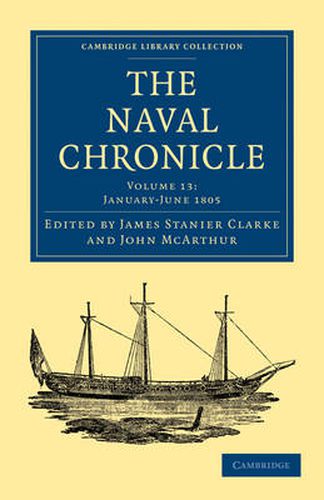Readings Newsletter
Become a Readings Member to make your shopping experience even easier.
Sign in or sign up for free!
You’re not far away from qualifying for FREE standard shipping within Australia
You’ve qualified for FREE standard shipping within Australia
The cart is loading…






The Naval Chronicle, published in 40 volumes between 1799 and 1818, is a key source for British maritime and military history. This reissue is the first complete printed reproduction of what was the most influential maritime publication of its day. The subjects covered range from accounts of battles and lists of ships to notices of promotions and marriages, courts martial and deaths, and biographies, poetry and letters. Each volume also contains engravings and charts relating to naval engagements and important harbours around the world. Volume 13 (1805) reveals how, following Napoleon’s coronation as Emperor and the outbreak of war with Spain, fears of invasion grew stronger. Parliament greatly increased expenditure on the Navy, but the lengthy lists of ships lost or captured on all sides show that resources were stretched. Topographical reports concentrate on French controlled ports, and literary and historical content in this issue was considerably reduced.
$9.00 standard shipping within Australia
FREE standard shipping within Australia for orders over $100.00
Express & International shipping calculated at checkout
The Naval Chronicle, published in 40 volumes between 1799 and 1818, is a key source for British maritime and military history. This reissue is the first complete printed reproduction of what was the most influential maritime publication of its day. The subjects covered range from accounts of battles and lists of ships to notices of promotions and marriages, courts martial and deaths, and biographies, poetry and letters. Each volume also contains engravings and charts relating to naval engagements and important harbours around the world. Volume 13 (1805) reveals how, following Napoleon’s coronation as Emperor and the outbreak of war with Spain, fears of invasion grew stronger. Parliament greatly increased expenditure on the Navy, but the lengthy lists of ships lost or captured on all sides show that resources were stretched. Topographical reports concentrate on French controlled ports, and literary and historical content in this issue was considerably reduced.